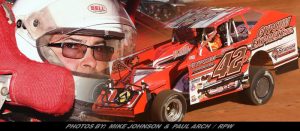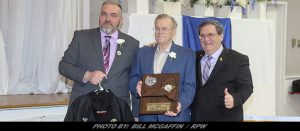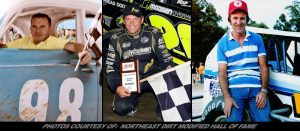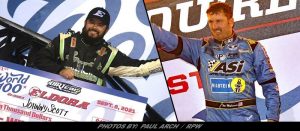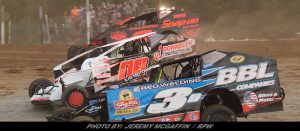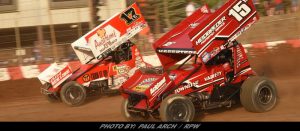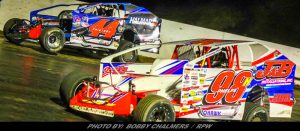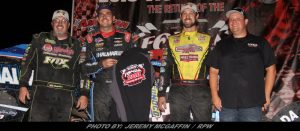Northeast Dirt Modified Hall Of Fame To Honor Late Nazareth Promoter Jerry Fried
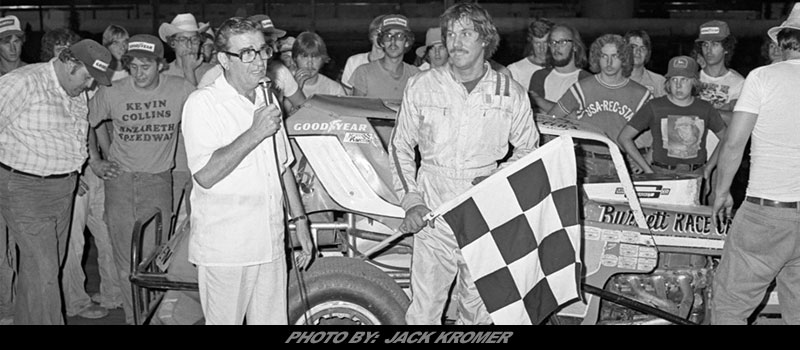
Story By: STEVE BARRICK / NORTHEAST DIRT MODIFIED HALL OF FAME – WEEDSPORT, NY – The late Pennsy race promoter Jerry Fried will be the recipient of the 2019 Leonard J. Sammons Jr. Award for Outstanding Contributions to Auto Racing, to be bestowed during the 28th annual Hall of Fame induction ceremonies, scheduled for Thursday, July 25, at the Northeast Dirt Modified Museum and Hall of Fame on the grounds of Weedsport Speedway in New York.
A native of the Bronx, Fried’s first business venture was in ballroom dancing, a nationwide craze after World War II. After a deal to build a new ballroom went sour, Fried became disillusioned with New York City life.
He abruptly moved west, to Northampton County, PA, where he crossed paths with a fellow New Yorker who had been buying up regional real estate — including the fairgrounds and speedway in Nazareth, PA, which was in bankruptcy.
Fried was able to persuade the bankruptcy court to rent the track to him on terms so favorable that any improvements he made to the property were deducted from his lease payments.
Fried was a rookie promoter in 1953, with no background at all in auto racing. But from operating ballrooms, he knew how to publicize popular entertainment — how different could it be? — and put Nazareth Speedway on solid ground.
Physical improvements were made to the property, including the installation of a lighting system, and in Fried’s third year at the helm, Nazareth switched to Sundays which became race night until the track closed.
Over the years, Fried put his own mark on rules and regulations — and radically changed the sport, at every turn.
In 1956, Fried made his drivers happy and his fellow promoters irate: He offered his drivers a guaranteed purse, instead of the customary percentage of the gate revenue. Within a year, guaranteed purses were adopted by Fried’s rivals.
Fried was a proponent of safety, taking action after Hall of Fame driver Jackie McLaughlin was killed at Nazareth in 1964. Shaken by the death, Fried mandated that braced headrests be installed on all cars. In this, Fried was decades ahead of his time in understanding the critical need for driver containment.
Fried’s proactive view of rule formulation was seen years later when, in an attempt to cut competitor costs for the 1982 season, Fried entered into an agreement with Towel City Retreads to become the exclusive provider of race tires for Nazareth.
The tires were initially offered at $85 a piece, a fraction of the price of Goodyears or Hoosiers which were competing in a wholly unregulated race tire market.
Drivers and media members chided Fried about “putting retreads on our cars.” But he stood his ground. Farsightedly, Fried created the track tire concept, and with it a reliable revenue stream for speedways that is now standard in the industry.
On the grandstand side, Fried instituted a generous rain check directive: Any rain check could be redeemed at full face value for any subsequent race. It was as good as cash.
He stood up for the fans in other ways, too. A champion of sportsmanship and personal decorum, Fried dressed, carried himself, and spoke like a business executive. And he expected his drivers to respect his fans.
When an enraged Gary Balough gave fans “the finger” after an on-track incident in 1974, Fried was so distressed by the display of vulgarity that he suspended Balough until he publicly apologized to the crowd.
Balough held a grudge for years but fans had another reaction: They praised Fried for upholding civility by not tolerating unsavory behavior.
By the 1960s, Jerry Fried branched out his speedway operations.
He negotiated a long-term lease to operate stock car racing at Dorney Park Speedway. Under Fried, racing thrived on the tiny fifth-mile asphalt oval, nestled in the middle of an amusement park, for the next quarter of a century.
By any reckoning, Fried’s grandest plan was to build a lit mile-and-an-eighth dirt track next to the half-mile. It was, and still is, the only dirt track ever built for auto racing that was longer than one mile.
On October 15, 1966, Nazareth National opened with a good crowd and lots of fanfare. Most other events were successful as well — some 50 in all, under Jerry’s direction — but the high cost of borrowing the money to fund Nazareth National’s construction eventually consumed Fried.
In 1971, Fried planned an ambitious season, divided between his two Nazareth tracks. His timing could not have been worse.
The upstart Tri-State Driver & Car Owner Association formed in 1971, leased Harmony Speedway, just across the Delaware River from Nazareth, and ran weekly races. Tri-State folded after two years but not until shaking local Modified racing to its core. No tracks suffered more than Nazareth and Nazareth National. After Tri-State, the small track limped along but National was all done for Fried. Several years later, the track was briefly reopened under the promotership of Fried’s nemesis, Reading’s Lindy Vicari.
The ’80s were tough times. Nazareth needed capital investment — in clay, in fences, in grandstands, in concessions and in parking lots. On top of that, Fried had lost Dorney Park, which had been sold to a publicly traded amusement park conglomerate.
This was a mortal blow for Fried. Devastated from the Nazareth National reversal, now ousted from Dorney Park, he faced the prospect of chugging along with an aging facility. It proved to be too much.
He gave up Nazareth in 1987. The track ran through 1988, with the Cozze family propping it up, at which time redevelopment plans were announced for the property.
The last race at Nazareth was run on Labor Day, 1988. The next day, razing of the grandstands began.
A haunting image was taken of grandstand dismantlers at work removing the steel and wood as Fried, arms folded, looked on. Eleven months later, Jerry Fried died.
Fried’s vision and showmanship allowed him to manage three wholly different race tracks, two of which he owned, for three and a half decades. He was a champion for safer racing, less expensive racing, and for courtesy, even generosity to his tracks’ fans.


